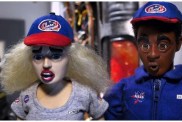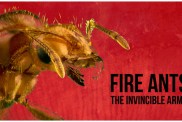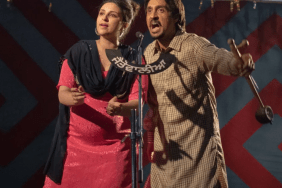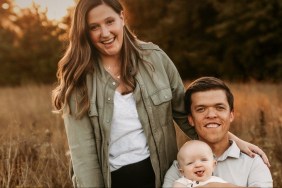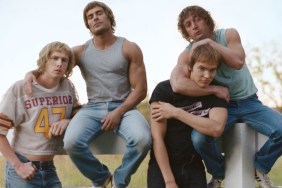As a filmmaker, you can do a lot worse than convincing Don Cheadle to star in your movie, not just because he’s a great actor, but also because you can’t find a much more eloquent spokesman for your movie. Relative newcomer Jeffrey Nachmanoff found this out when Cheadle signed on to star and co-produce his political thriller Traitor, which puts the actor in the role of Samir Horn, an ex-soldier from the Sudan who unwittingly becomes connected to a Muslim terrorist faction and becomes public enemy number one for the FBI and CIA. He soon finds himself being hunted across the globe by Guy Pearce’s Agent Roy Clayton and caught up in a web of intrigue that goes far beyond the black and white that most people normally associate with terrorism.
Cheadle was in New York to talk up the movie and ComingSoon.net was there to ask a couple of questions and here is what he had to say.
ComingSoon.net: Was there anything in particular that pulled you into the script as an actor and as a producer?
Don Cheadle: Well, at the time there were things in the news, when this script came across my desk. There were a lot of ideas and stories about security and Guantanamo and The Patriot Act and what rights you would give up in order to be secure and terrorism and radical Islam. All these ideas were floating around when this script came across my desk. It was interesting to me because the character that I play in the movie, Samir Horn, seemed to be somebody who encapsulated all those questions within his own journey in this film. “What is my allegiance to my faith, what’s my allegiance to my country? I feel like they’re both letting me down in some ways. Who do I believe in? Who do I listen to? Ultimately, who takes responsibility for these things?” In the film, he decides that he’s going to take his own responsibility for things, but that was interesting to me as a producer because I thought, “Wow, here’s a story that can potentially raise all those questions and may be fun to watch while you’re sitting there, this thriller, and having your conscience pricked a little bit.”
CS: Is it true the original concept for the movie was thought up by Steve Martin? He’s not someone you might expect to think this up.
Cheadle: Not the original idea, but the kind of twist in the movie. It was kind of reverse-engineered from his idea; it was kind of a “what if.” If you know about him, he’s a pretty serious writer. He’s a novelist and a playwright and an art collector. He’s not just the wild and crazy guy. He’s pretty deep in his game.
CS: Were you able to relate to this character at all?
Cheadle: I try to relate to every character that I play on some level and find a way in. I definitely related though I’ve never been in this situation. I related to a character who feels that he has to rely totally on himself and doesn’t necessarily trust the people that have put him in the position that he’s in and he has to try and find a way. That’s what’s most interesting as an actor for me, that this guy is wearing a mask. You’re wearing a mask while doing the part and then wearing a mask as the character and trying to find those moments where the mask gets pulled down or you have to push it back up. That was just the challenge and the fun of playing Samir.
CS: How hard was it to learn Arabic?
Cheadle: It’s like any other language or anything that you have to learn. It’s not my first language and I had to study it. I had tutors in every place that I went. The funny thing about it is that probably traveling across this country or Australia or anywhere is that the dialects are so different. I had one Arabic speaker who was mostly Egyptian in the United States and then we went to shoot in Toronto and the guy telling me how to do it there was Sudanese and then we went to Morocco and we had a bunch of Moroccans who were trying to show me. So every time we went to another place the words changed. It was like, “Wait a minute. I thought that was the word.” “No. That is not it.” Everyone was sure and positive that this was how you pronounced the words and how the cadence would be and this was where the inflection would go. It was similar when we did “Hotel Rwanda” and all the dialects were different. You just have to kind of find a mean and say, “This is our standard sort of Arabic” and just fall in line with that.
CS: What other research did you do to bring this character to life?
Cheadle: Mostly talking to a lot of people, a lot of interviewing individuals and reading a fair amount of articles and books about Islam, the Middle East and also a lot of stuff about our government and how our government works and the different departments that we have that focus on these things. Jeffrey also did a lot of research and kind of papered me with a lot of stuff, so we dug into it.

CS: As a character, he’s sort of a grey area between being a terrorist but being one with a conscience. Once you signed on, did you want it to lean more one way or the other?
Cheadle: When I first read the script, there were some things that happened, events in the film–it’s hard to talk about without giving too much away. I wanted it to be a little edgier than it was when I first got it. We took it out of turnaround at Disney and I didn’t think that they were ever going to make the movie anyway, and if they were going to make it they were going to really Disney it up. I thought it was already leaning towards something a bit more whitewashed than I wanted it to be. I wanted to dirty it up. We’re talking about a subject matter where people have to get hurt or it won’t feel that there’s any veracity. There has to be a cost for everything that’s happening and a real cost or else this character isn’t really weighing heavy at all. If people always narrowly escape, that’s not what this is about. This is about someone going, “I’m putting other lives at risk and I’m deciding to do that. How do I now deal with the fact that in my mind I’m playing God when my faith tells me that I have no right to do that?”
CS: This film deals with the very real threat of terrorism, but it’s engaging enough to keep the audience interested in your character’s story. Can you talk about finding that balance?
Cheadle: Look, I think the first job of a movie is to entertain. I like to try and smuggle in things that people can have a talk about when they leave the theater because those tend to be the most enjoyable movie experiences that I have, where I can go sort of escape and let it be a ride, but also leave the film thinking and having a discussion with people about the film. I don’t mind a debate either. We weren’t really trying to answer questions as much as raise them. We were obviously very cognizant of the subject matter and the world that we were dealing with so we tried to be clear about that. Ultimately for us though the movie was really an espionage and spy thriller that happened to have its background be some real things that went on the world.
CS: Can you talk about working with Guy Pearce?
Cheadle: I don’t know who that is. (laughs)
CS: As a producer, were you involved with casting him as the FBI agent chasing after you?
Cheadle: Yeah, Guy is obviously a really talented actor and famous for playing a bunch of different types of roles with different characters and dialects and everything. I said, “Who’s that?” because Guy and I joke about having three or four scenes together in this movie and we’re constantly asked, “What’s it like doing a movie with Guy Pearce?” I have to say that I don’t know. I think it’s okay, but I’ve seen you more than I saw Guy during the whole shoot.
CS: How important do you think it is to have these two characters, one who’s an overt Christian and the other an overt Muslim come together and have a dialogue?
Cheadle: I don’t know. I think the takeaway for both of us as characters in the movie about our respective religions, that part of the discussion was something that was interesting to me, the story that he tells about growing up and his father being a Christian and the people that were calling themselves Christians were burning crosses and the people calling themselves Christians were putting those crosses out. With my character, people who were calling themselves devout Muslims were blowing people up and people who were also calling themselves devout Muslims were also trying to impress that no one has a monopoly on what it means to be either of those things. As far as the discussion that filters through the movie, that’s a very interesting one to me and it was clearly something that Samir as a character was focused on. My faith and his faith in this movie dictated to him that what these people he was with were saying that they were Muslims was completely counter to. I remember that we had a scene in the movie where we’re all sitting around discussing what we’re going to do when the main bad guy character in the movie pulls out the Koran and kisses it and puts it down. The other Muslims in the film and that were on the crew were like, “Nah, that’s a little too far. That’s defaming it.” We don’t want to do that, but he said, “Isn’t that the whole point?” So they had the discussion that I stayed out of about what was too far and what was profane and what we could do. There have been movies, and I know of one movie that my friend was working on and some art director had no idea about Islam and tore some pages out of the Koran and burned them for a scene and they shut down the movie and had to leave the country. That was it. It was a wrap. So I stayed out of that. I respect other people’s culture and religion.
CS: What film was that?
Cheadle: I can’t remember the name, but it was ten or twelve years ago that this happened, but they decided that it made sense that this character is claiming the religion for his purposes because that’s what people do. They always hide behind that when you want to do whatever you want to do, whether good or bad. “That’s not me. It’s God. I’m just God’s messenger crushing you so that I can have power.” It’s like, “Really? Is that what the religion says? Okay.”

CS: As the producer, how involved were you with creating the trailers and commercials? They kind of give away an important subplot in the movie.
Cheadle: I think it’s always a push-pull. This is the most interesting part of the whole movie-making process. You can do whatever you do and then you have to deal with the marketing department and how you get this story out and what’s the best way to draw an audience without telling them the whole story, as you said. This was a really difficult trailer to figure out how to cut because you don’t want to give away the plot, but you want to say that there IS a plot with intrigue and that there’s twists and turns. That was a point of contention for me as well. We went back and forth a lot with that. I know that Jeffrey Nachmanoff and myself really wanted to pull back on that stuff, and it’s pulled back from what it was.
CS: Is it difficult to play that character in the same way, because you want people to know who and what he is, but you also still need to keep some mystery there?
Cheadle: We believe that in the first twenty minutes of the movie, if you don’t really believe who this guy is and that he’s really doing what he’s doing that there’s no payoff when it switches, if it does indeed switch. I know that Jeffrey and I and our other producing partner and the DP Jimmy Muro were always trying to figure out how to reveal, how to let the audience know something that he can’t let the people he’s with know. We had to figure out how to let the camera be the person that Samir holds counsel with and how would that work really. Is that in single or doubles, two shots? How do we figure out the language so that the audience understands something that this person has to have a private moment in a public place. It was a challenge, but I feel comfortable that we kind of cracked that nut.
CS: You’ve done a few movies that have highlighted issues you seem to care about. At what point in your career did you decide you wanted to make movies like that?
Cheadle: Well, this wasn’t one of them. This was something I thought was important, not just to me but to the world. I thought this was a world discussion. Everyone is talking about this to some degree and especially in the United States, trying to focus on whether we’re safe, how we’re safe, what we’ll do to maintain a semblance of safety because how are you ever really completely safe. This character was wrestling with all those things too. How far do you go and how much collateral damage is justifiable? That was just something that was interesting to me and I tend to find projects that come to me that have a very humanistic sort of approach to things like that. I find that interesting and those are things I’m engaged in, but it’s not like I go, “This is an issue that I want to tackle. Lets find a movie that serves that.” It was the same thing with “Hotel Rwanda.” I wasn’t someone who was active in that area as well and wasn’t thinking about Darfur and the Sudan. I thought it was just a great script and a very interesting story that would be compelling. So it doesn’t kind of work the other way around. I don’t look for movies that tackle an issue.
CS: Have you always been interested in world issues?
Cheadle: I’ve always been interested in the world. I’ve always been interested in politics and how we get to the places that we get to with the people leading us sometimes in good ways and sometimes in a bad ways. That’s always been an interest of mine, but I think these things are finding their ways into movies more and more often because that’s what’s happening around us. It’s either that or complete escapism and they’re both definitely important. I can’t imagine anyone would think that the “Ocean” series is relevant in any way, but it’s pure escapism and that’s fun too. They both have their place.
CS: Do you think America is ready for this film?
Cheadle: I don’t know. I don’t know why they wouldn’t be. They were ready for “The Bourne Identity.” This is kind of a “Bourne Identity” with something behind it that you can actually have a discussion about. We’ve gotten everything from this being jingoistic and too patriotic to us trying to humanize the terrorists we get it all, all sides of it. To me that’s good because it’s a debate and to me that’s what’s interesting about what you can do with this art form, inspire that kind of debate. But mainly you want to entertain people. That’s my belief, that the first thing to do is to give people something to go to where they can kind of go away for a minute and come back.
CS: I ask this every time I see you, but is there any progress on the Miles Davis movie?
Cheadle: No. Ask me next time. (laughs) Yes, there is progress. We have a script and we’re still developing it. We sold the movie to HBO-Picturehouse several months ago and then HBO and Picturehouse did their thing (Note: Time Warner has shut down Picturehouse) so now we’re trying to figure out if that’s where we’re going to make it or if we’re going to make it somewhere else.

CS: Have you tried to bring some of the crews you’ve worked with as an actor to the movies you’ve produced and to a movie like this you’ll direct?
Cheadle: I’m going to see. We liked Jimmy [Muro] for this one. It seemed to be a good fit and Jimmy wanted to do it and we thought that was good, but I don’t have any particular marching orders when I do this Miles Davis thing. I’m going to see what’s up. I’m already using a different DP.
CS: Are you going to do any more of the “Ocean” movies?
Cheadle: No, there’s no more “Oceans”; it’s a wrap on the “Oceans” trilogy.
CS: With the recent passing of Isaac Hayes and Bernie Mac, does it make you reflect on how fragile life is?
Cheadle: I didn’t need their passing to do that. Every morning when I get up and see my kids, that’s what it is for me. Those were tragic passings and they definitely both went too soon and it was really a shock. Gene Upshaw. It’s like, what is this black men under seventy thing going on? It’s rough, but if there’s ever a plus from things like that it’s that, that it makes you think about cherishing everyday and living a good life.
CS: How serious were you about moving out of the country depending on how the upcoming election goes?
Cheadle: I’m pretty serious about being very concerned. I wish I could say for sure that I knew what was going to happen, but I think we’re in a mess right now and I don’t know why anyone would even want to be president right now to begin with, but if you’re going to take that on you’ve got a lot of stuff to untangle.
CS: What do you think of Joe Biden as Vice President?
Cheadle: I don’t know. That remains to be seen to. I know the senator. I don’t know if that’s going to do what they want it to do. To me right now we’re in bizarro land with all of it.
Traitor opens nationwide on Wednesday, August 27.
